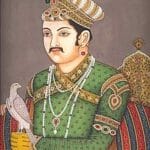
Akbar, also known as Akbar the Great, was the third Mughal emperor, reigning from 1556 to 1605. Born on October 15, 1542, in Umarkot, Sindh, he ascended to the throne at the tender age of 14 after the death of his father, Humayun. His early reign was characterized by a struggle for power, but with the guidance of his regent, Bairam Khan, Akbar quickly established his authority and expanded the Mughal Empire.
One of Akbar’s most notable achievements was his military prowess. He expanded the empire significantly through a series of successful campaigns across northern and central India, incorporating diverse territories into his realm. Notably, he captured the strategic city of Chittorgarh and defeated the formidable Rajput kingdoms, establishing alliances through both marriage and diplomacy. His campaigns were marked by innovative military tactics and a strong cavalry, enabling him to maintain control over vast and varied lands.
Beyond his military conquests, Akbar is renowned for his administrative reforms. He implemented a centralized system of governance that allowed for more efficient tax collection and management of the diverse populations under his rule. His policies promoted meritocracy, where positions in the administration were awarded based on ability rather than birthright. Akbar’s revenue system, known as the “Zabt,” was particularly significant; it streamlined tax collection and allowed for more predictable income for the empire.
Akbar’s reign was also marked by a commitment to religious tolerance and cultural integration. He actively sought to promote harmony among the diverse religious communities in his empire, including Hindus, Muslims, and Jains. His establishment of the Din-i Ilahi, a syncretic religion, sought to bridge the gaps between various faiths, although it did not gain widespread followership. His tolerance was further exemplified by the abolishment of the jizya, a tax imposed on non-Muslims, which reinforced his image as a just and fair ruler.
Culturally, Akbar’s reign witnessed a golden age in the arts and literature. He patronized some of the greatest artists, poets, and scholars of his time, leading to the flourishing of Mughal painting, architecture, and literature. The construction of monumental structures like the Fatehpur Sikri and later the Taj Mahal under his descendants reflects the artistic zenith of this period. His court became a center of intellectual discourse, attracting talents from various regions.
Moreover, Akbar’s legacy is characterized by his efforts to create a unified state amidst a tapestry of cultures. He encouraged dialogue between different faiths and communities, fostering an environment of relative peace and cooperation. His successors, particularly Jahangir and Shah Jahan, built upon his foundations, though they faced challenges in maintaining the same level of integration and tolerance.
In conclusion, Akbar’s reign was transformative for the Mughal Empire. His military conquests, administrative innovations, commitment to religious tolerance, and patronage of the arts not only expanded the empire but also enriched its cultural landscape. Akbar is remembered as a visionary leader whose policies laid the groundwork for a prosperous and diverse empire, leaving a lasting impact on Indian history. His legacy continues to be celebrated, representing a high point in the cultural and political tapestry of India.
